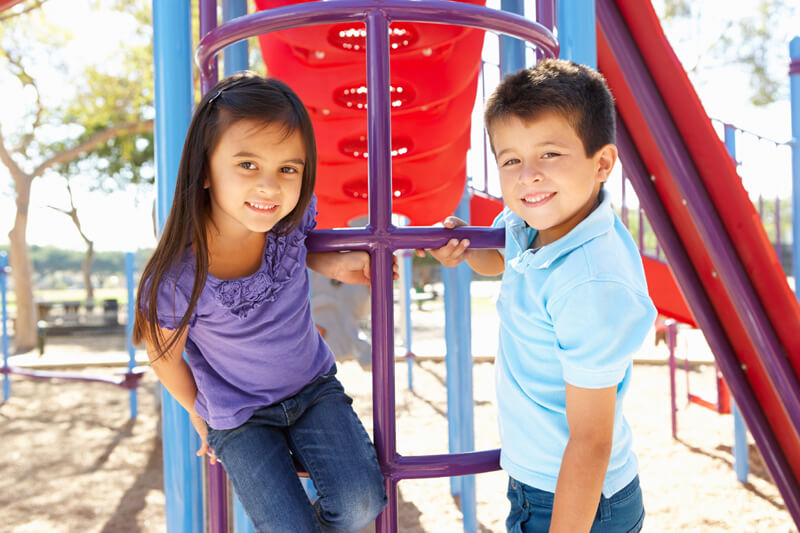New research, video, and infographics highlight how sharing recreational facilities and safer, walkable neighborhoods can boost access to active spaces among Latino kids.
Latinos have limited spaces to be physically active, but sharing recreational facilities and creating walkable neighborhoods are promising solutions to improve access to and safe use of active spaces, according to a new package of research from Salud America!, a national network for Latino childhood obesity prevention funded by the Robert Wood Johnson Foundation and based at The University of Texas Health Science Center at San Antonio.
Salud America!’s Active Spaces and Latino Kids research package includes an in-depth review of the latest science on the U.S. physical activity environment for Latinos, policy recommendations based on that research, and an issue brief, animated video, and infographics.
Research shows that 81% of Latino neighborhoods did not have a recreational facility, compared with 38% of white neighborhoods.
Fear of crime and poor neighborhood conditions also prohibited Latino kids from being active.
Ways to improve Latinos’ access to active spaces include:
1. Shared use agreements—formal contracts between a school and a city, county, or sports league, that outline terms and conditions for sharing existing physical activity facilities—have helped increase access to active spaces in some Latino communities. (For example, a shared use agreement in Los Angeles’ Boyle Heights neighborhood (94% Latino) opened school facilities to the public to provide fields for soccer, dance rooms for Zumba classes, and open space for walking clubs.)
2. Improved park maintenance and safety increases Latinos’ use of active spaces.
3. Safer routes and streets improve young Latinos’ access to active spaces. For example, a “complete streets” policy can slow vehicular traffic and add crosswalks, sidewalks and protected bicycle lanes, encouraging safe, active transportation.
“Latino kids don’t get enough exercise, so it’s critical to make parks, school playgrounds, and other recreational sites safer and more accessible to help Latino kids be active and fight obesity,” said Dr. Amelie G. Ramirez, director of Salud America! and the Institute for Health Promotion Research at the UT Health Science Center at San Antonio.
Obesity is a problem among Latino kids. Nearly 40% of U.S. Latinos ages 2-19 are overweight or obese compared to 28.5% of non-Latino whites.
To examine the barriers preventing Latino children from growing up at a healthy weight, and provide suggestions on solutions, Salud America! is developing five new packages of research, infographics, and videos that cover:
Better Food in the Neighborhood (Dec. 8, 2015);
Active Spaces (Jan. 12, 2016);
Healthier Schools (January 2016);
Healthy Weight by Kindergarten (January 2016); and
Sugary Drinks (February 2016).
The Better Food in the Neighborhood research review includes these policy recommendations:
State and local governments should work with schools, cities, counties, and sports leagues in Latino communities to adopt shared use agreements with clear language to describe terms, conditions, and covered activities, and address liability and other concerns to increase public access to school facilities after hours.
Local policymakers should establish “complete streets” policies for new transportation projects near schools, active spaces, and other family destinations to make it easier for residents to walk or bike to those sites.
Local governments should include sustainable funding for park maintenance and safety repairs and improvements. State and local agencies should examine innovative park maintenance and funding, such as “workreation,” where kids work at a park in exchange for use of park facilities, and the National Recreation and Park Association’s Fund Your Park crowdfunding platform.
“It will take leaders at all levels working together to truly create neighborhoods where Latino families can easily, safely bike, walk, and much more,” Ramirez said.
Access the full Salud America! “Active Spaces and Latino Kids” research package at http://www.communitycommons.org/groups/salud-america/big-bets/sa-active-spaces/.
Salud America! The RWJF Research Network to Prevent Obesity Among Latino Children
Salud America! is a nonprofit network launched in 2007 that develops multimedia communications to educate and motivate its national online network—more than 50,000 kids, parents, teachers, academics, healthcare providers, and community leaders—to take action to reduce Latino childhood obesity and build a culture of health. The network was created and funded by the Robert Wood Johnson Foundation (RWJF) and is directed by Dr. Amelie G. Ramirez, a health disparities researcher and director of the Institute for Health Promotion Research at The University of Texas Health Science Center at San Antonio. Visit Salud America! at http://www.communitycommons.org/groups/salud-america/. Follow Salud America! on social media via its @SaludToday handle on Twitter, Facebook, YouTube, and WordPress.
About the Robert Wood Johnson Foundation (RWJF)
For more than 40 years the Robert Wood Johnson Foundation has worked to improve health and health care. We are striving to build a national Culture of Health that will enable all to live longer, healthier lives now and for generations to come. For more information, visit www.rwjf.org. Follow the Foundation on Twitter at www.rwjf.org/twitter or on Facebook at www.rwjf.org/facebook.
The University of Texas Health Science Center at San Antonio, with missions of teaching, research and healing, is one of the country’s leading health sciences universities. Its schools of medicine, nursing, dentistry, health professions and graduate biomedical sciences have more than 32,200 alumni who are advancing their fields throughout the world. With six campuses in San Antonio and Laredo, the university has a FY 16 revenue operating budget of $801.8 million and is the primary driver of its community’s $30.6 billion biomedical and health care industry. For more information on the many ways “We make lives better®,” visit www.uthscsa.edu.


